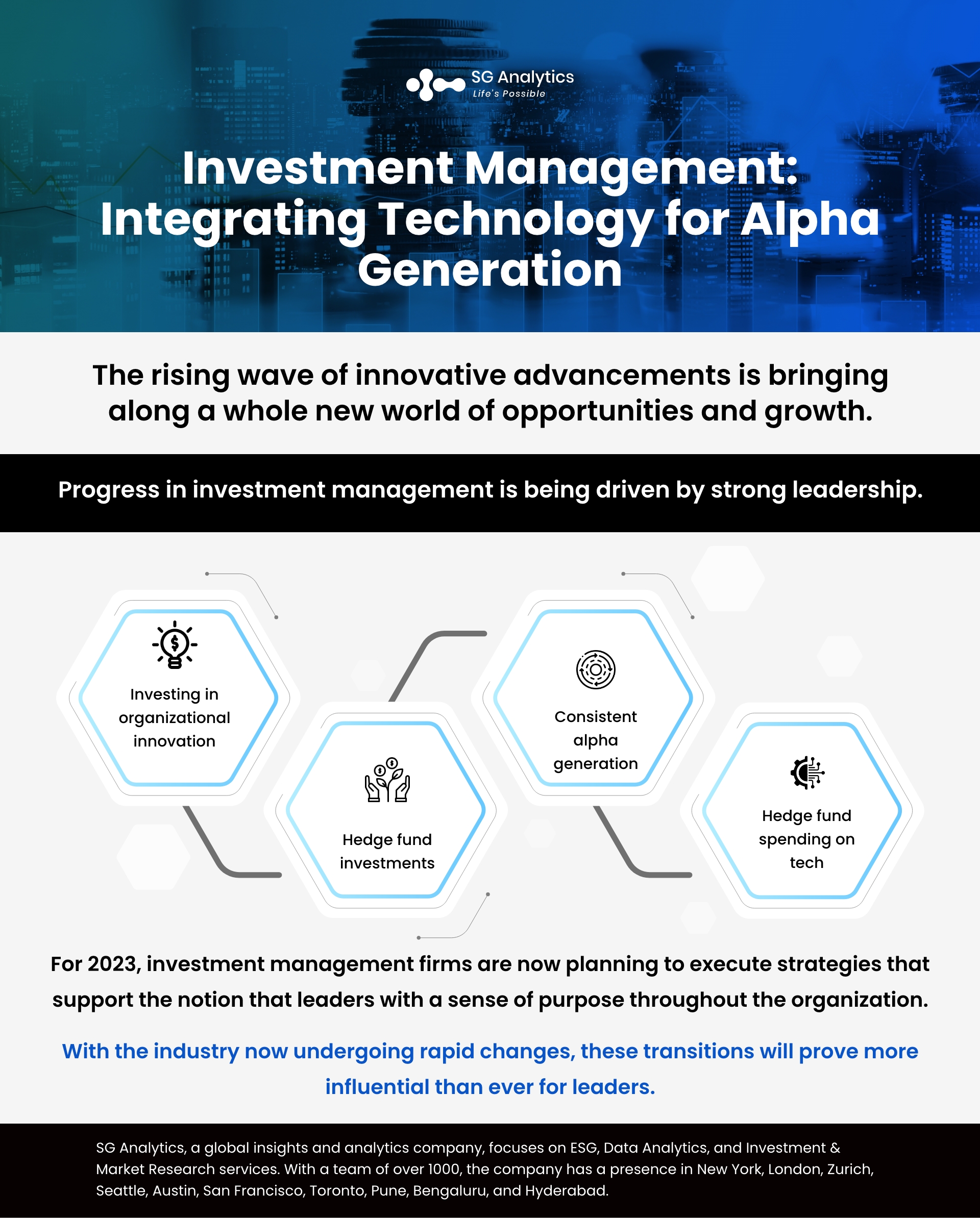Technology is dramatically changing the world. And the rising wave of innovative advancements is bringing along a whole new world of opportunities and growth. Technology is equally impacting investment management, yet some portfolio managers are still reluctant to adapt. However, leading investment managers continually upgrade their operations by adding new innovations in search of alpha, so every firm can afford to be included.
In investment management, efforts often fall somewhere in the middle. While process changes occur dramatically through new data sources and analytical capabilities, it helps with new product development. A recent Deloitte research exhibited that the more comprehensive a project is, the more hands-on leadership it requires from key executives and leaders. And higher leadership is beneficial for investment process transformation due to the need for better collaboration and coordination. By establishing a strong connection between progress and corporate culture improvement, businesses can foster digital transformations.
Read more: Forecast: Top Venture Capital Market Trends In 2023
Digital transformation for Growth
Technology is providing investment managers an added advantage to integrate it into their everyday operations. While there are multiple stages of digital transformation ranging from process improvements to new operating models, businesses are exploring new frameworks to demonstrate a more comprehensive outlook.

Digital transformation involves investing in new innovations to enhance the client experience and gain operational efficiencies for investment managers. There are multiple stages of digital transformation - from incremental process improvement to designing new business operating models. However, the efforts in investment management often fall in the middle, where process changes are dramatic. By integrating new data sources and analytical capabilities, businesses can enable new product development. With comprehensive research, higher leadership can benefit from the transformation process. And the connection between advancements on the digital transformation journey as well as company culture is remarkably strong.
One of the most vital trends in the industry is discretionary managers embracing the integration of new technological advancements to gain profit from the digitization of key activities. In view of this, investment management leaders are increasingly partnering with third-party providers, thereby enabling their funds to focus more on their core activity of generating alpha. However, with the constant development of new technologies, businesses are finding it increasingly difficult and costly to sustain their internal infrastructure. With easy access to powerful technology, businesses are able to permit discretionary investment managers to become more technology-driven investors.
Read more: How are Impact Investors Tackling the New Opportunities in Climate Investment?
Understanding the Virtuous Cycle of Investment Management
Progress in investment management is being driven by strong leadership. Investment leaders provide the initiating spark for their brand's success and guide their organization to achieve their firm's vision. By investing in talent, tools, and technologies, industry leaders are assisting their firms in achieving competitive advantage and efficiency.

The funds are also portraying a growing propensity to systematize different operational parts of the investment process. Businesses are now able to address the role of managers and the significance it plays in delivering attractive returns to clients. To unlock the true value of the accumulated financial data, firms need to have access to a powerful research environment that offers flexibility across asset classes. Through effective infrastructure development, they will be able to fragment their processes and foster collaboration.
Investment firms are establishing the application of technology to be the connection between technology implementation and revenue. Many investment managers are integrating those technologies to incorporate new datasets into the decision-making processes. They are also employing technology to streamline their operational integration.
These developments are offering investment managers the advantage of becoming better investment decision-makers. Active managers are also prioritizing research and analysis to gain an advantage over their competitors. The advantages of available information are enabling investment managers to outperform those with access to less information reliably. It is now slowly becoming a more frequently employed path to generate advantage legitimately.
-
Investing in Organizational Innovation
Within an organization, expected changes in spending can be witnessed for major technology categories. However, one significant difference between the spending expectations of managers and those of other members of the firm was in blockchain as well as a distributed ledger. A total of 23% of finance executives predicted a large increase in spending on these major technologies, compared to only 11% of executives from other divisions of the firm.

Read more: How is Multi-stakeholder Assessment Helping to Create Long-Term Sustainable Value?
-
Hedge fund Investments
Open-ended hedge funds are by far the most popular vehicle for investment. While the rest of the differences are minimal, they do highlight that finance executives often expect larger increases in spending on technology when compared with other parts of the firm. However, the only significant exceptions involve cloud computing, storage, and cybersecurity.
-
Consistent Alpha Generation
Leading investment managers are striving to deliver alpha consistently and efficiently for their organizations. However, reinvestments in the firm focus on enhancing alpha generation and, by extension, supporting client experience and operational efficiency. Artificial intelligence, data acquisition, and processing, along with data analytics, are emerging as the key technologies capable of contributing to alpha generation. Businesses are now planning to increase their spending on major technologies more than their counterparts.
-
Hedge fund Spending on Tech
Investment managers are expecting a large increase in organizational spending on AI and data analytics. They now have much higher probabilities of significantly improving the revenue prospects in 2023 for businesses when compared to those who did not expect large increases in spending.

Key Highlights
-
Effective leadership and a set organizational vision will help enhance efficiency as well as an overall success.
-
With investment management being talent-driven, many businesses are functioning to optimize their talent models. They are updating their workplace policies for employee satisfaction. But these updates are not enough. Businesses need to establish and
-
communicate a corporate purpose for improved efficiency and opportunity.
-
Investment firms that are investing in digital transformation with new technologies are now working to improve the client
-
experience, along with gaining operational efficiencies to generate alpha.
-
Leadership is assisting firms in driving changes effectively with proper communication in order to foster collaboration across divisions to achieve transformative results.
-
Investment management firms are planning and executing their strategies for 2023, as leaders are engraining a sense of purpose to improve the chances of success on multiple levels.
Read more: The Future of Business Intelligence: Top Trends for 2023 and Beyond

A Step Forward
For 2023, investment management firms are now planning to execute strategies that support the notion that leaders with a sense of purpose throughout the organization are likely to take meaningful steps to success on many levels. Considered the most important asset of investment management firms, employees assist in planning investments over the coming year that could benefit the firms. Culture in an organization correlates with all the components of the virtuous cycle.
Human bias in investment has long eroded the alpha generation. New analytical capabilities are helping quantify the factor and provide institutional investors with powerful performance advantages. With modern behavioral analytics, businesses can create a new imperative for the investment industry. Institutional investors are now taping into the power of behavioral analysis to enhance investment outcomes.

In 2023, investment firms that will invest in training their workforce, as well as technologies, will witness improvement in operational efficiencies and are more likely to generate a positive impact on client experience. This will also enable the employees to execute the firm's vision. As firms are now investing in on-strategy projects and delighting clients, they are fostering a sense of accomplishment within the organization. Investment management firms are set to have a strong culture to enhance communication and promote purposeful vision. With the industry now undergoing rapid changes, these transitions will perhaps prove more influential than ever for leaders in 2023.
With a presence in New York, San Francisco, Austin, Seattle, Toronto, London, Zurich, Pune, Bengaluru, and Hyderabad, SG Analytics, a pioneer in Research and Analytics, offers tailor-made services to enterprises worldwide.
A market leader in Investment Insights, SG Analytics assists in strengthening investment decisions by leveraging custom research support. Contact us today if you are in search of an investment research firm that offers tailored research support across a broad range of asset classes.









